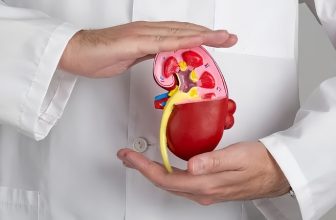Hypothyroidism and how it affects weight gain.
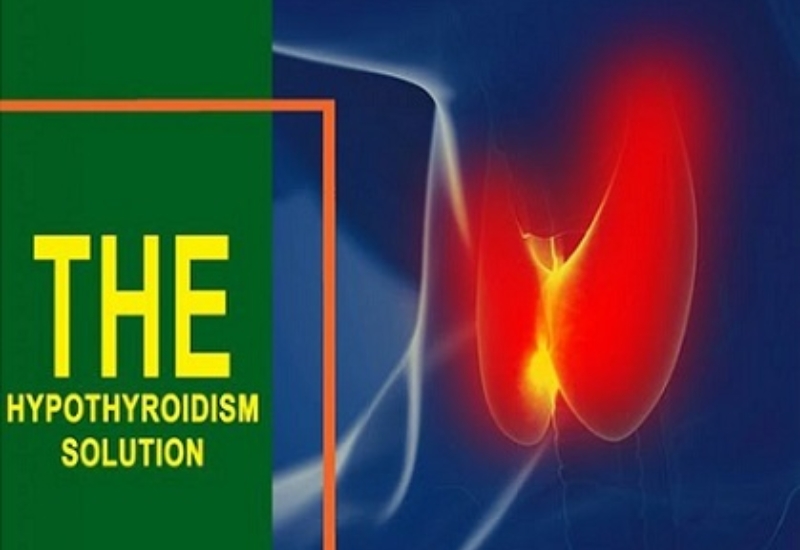
Understanding Hypothyroidism: Causes and Symptoms
What Is Hypothyroidism?
Hypothyroidism is a condition in which the thyroid gland does not produce enough thyroid hormones. The thyroid hormones (T3 and T4) play a critical role in regulating metabolism, energy production, and the functioning of many other body systems. When thyroid hormone levels drop, metabolism slows down, which can result in a variety of symptoms, including fatigue, depression, dry skin, and hair thinning.
The thyroid gland is located in the neck, and it releases hormones into the bloodstream to regulate various processes, such as heart rate, body temperature, digestion, and muscle function. When there is not enough thyroid hormone circulating in the body, it can lead to a decrease in the speed of these processes.
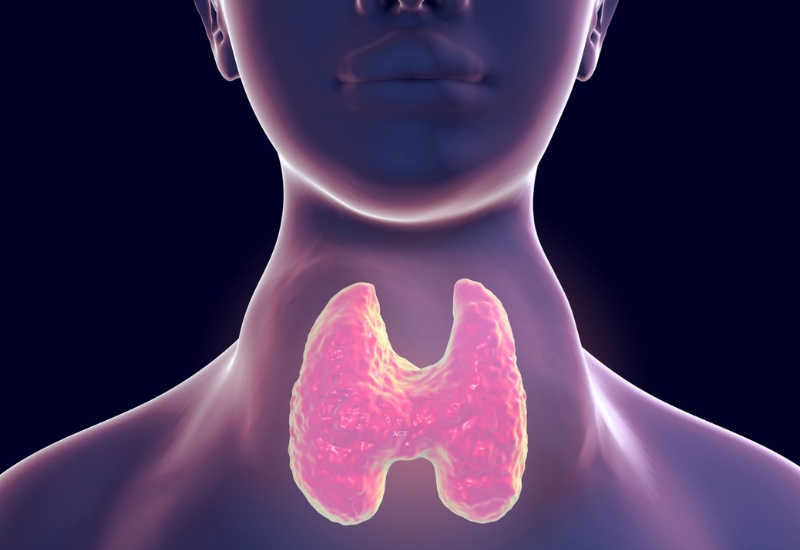
Causes of Hypothyroidism
Hypothyroidism can be caused by several factors. The most common cause is Hashimoto’s thyroiditis, an autoimmune disease in which the body’s immune system attacks the thyroid gland, leading to its destruction and decreased hormone production. Other causes of hypothyroidism include:
- Iodine deficiency: Iodine is essential for the production of thyroid hormones. In areas where iodine deficiency is prevalent, hypothyroidism is more common.
- Thyroid surgery: Surgical removal of the thyroid gland or part of it can result in hypothyroidism.
- Radiation therapy: Radiation treatment for certain types of cancer can damage the thyroid and lead to hypothyroidism.
- Medications: Certain medications, such as lithium or amiodarone, can interfere with thyroid function and lead to hypothyroidism.
- Genetics: A family history of thyroid disease can increase the risk of developing hypothyroidism.
Common Symptoms of Hypothyroidism
The symptoms of hypothyroidism can vary widely, and they often develop slowly over time. Some common symptoms include:
- Fatigue and low energy: Due to the slowing of metabolism, people with hypothyroidism often feel tired or lethargic, even after a full night’s sleep.
- Weight gain: A common symptom, often linked to a slower metabolic rate.
- Cold intolerance: Feeling cold even in warm environments due to a decreased ability to regulate body temperature.
- Dry skin and hair: Hormonal imbalances can affect skin and hair health, leading to dryness and thinning.
- Constipation: A slower metabolism can also lead to digestive issues, including constipation.
- Depression: Hormonal fluctuations can influence mood, leading to feelings of sadness, depression, or irritability.
- Muscle weakness: A reduced metabolic rate can also affect muscle strength, leading to weakness or aches.
While hypothyroidism is treatable, the weight gain associated with the condition can be difficult to manage, especially if other symptoms are affecting daily life.
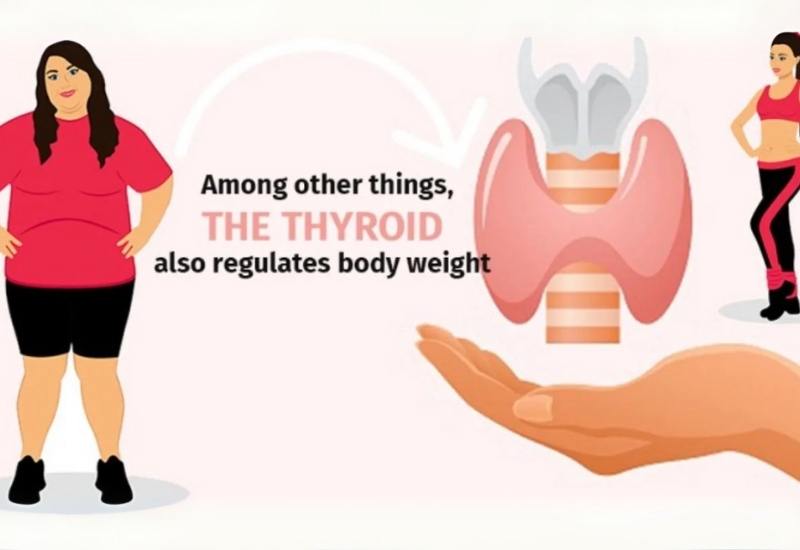
How Hypothyroidism Affects Weight Gain
Slower Metabolism and Reduced Energy Expenditure
One of the primary ways in which hypothyroidism contributes to weight gain is through a slower metabolism. Thyroid hormones play a crucial role in regulating the body’s metabolic rate—the rate at which the body burns calories. When thyroid hormone levels are low, the body’s metabolism slows down, meaning it burns fewer calories throughout the day. This decrease in calorie expenditure can result in the accumulation of excess body fat, even if an individual is eating a normal or moderately healthy diet.
The thyroid hormones, particularly T3, help regulate key enzymes involved in metabolic processes, including the breakdown of fats, proteins, and carbohydrates. With insufficient thyroid hormones, the body may struggle to efficiently metabolize nutrients, leading to fat storage rather than fat burning.
Increased Insulin Resistance
Hypothyroidism is also associated with insulin resistance, a condition in which the body’s cells become less responsive to the hormone insulin. Insulin is responsible for helping glucose (sugar) enter the cells, where it is used for energy. When insulin resistance occurs, glucose cannot enter cells efficiently, leading to higher levels of circulating glucose and insulin in the bloodstream. This can promote fat storage, particularly around the abdomen.
Moreover, insulin resistance is a known risk factor for type 2 diabetes and other metabolic disorders. People with hypothyroidism may be more likely to develop insulin resistance due to the altered metabolic state caused by low thyroid hormone levels.
Increased Fat Storage and Decreased Fat Breakdown
Thyroid hormones influence the activity of enzymes responsible for both fat storage and fat breakdown. With hypothyroidism, there is often an imbalance that favors fat storage over fat breakdown. This means that even if a person does not significantly alter their diet or exercise habits, they may still experience increased fat accumulation, particularly in areas such as the abdomen, hips, and thighs.
The decreased breakdown of fat is a direct consequence of lower levels of thyroid hormones. This, combined with a slower metabolism, can create a cycle where weight gain becomes progressively harder to manage, especially if dietary habits are not adjusted to compensate for the slower metabolism.
Hormonal Imbalances Affecting Appetite Regulation
Hypothyroidism can also interfere with appetite regulation. For some people, hypothyroidism leads to increased hunger, which can result in overeating and weight gain. This may be due to changes in hormones like leptin and ghrelin, which are involved in regulating hunger and satiety. Leptin helps to signal to the brain that the body has enough energy reserves (fat), while ghrelin stimulates appetite.
In hypothyroidism, leptin levels may decrease, which could signal to the brain that the body is starving, increasing hunger. At the same time, the body’s ability to burn fat is reduced, leading to a more persistent sensation of hunger, which can make it harder to control calorie intake.

Managing Weight Gain with Hypothyroidism
While weight gain can be a challenging aspect of living with hypothyroidism, there are several strategies that can help manage and even reduce excess weight. Managing hypothyroidism effectively requires a combination of medical treatment, lifestyle changes, and careful attention to diet and exercise. Here are some practical steps that can help individuals with hypothyroidism manage their weight:
1. Proper Diagnosis and Thyroid Hormone Replacement
The first and most important step in managing hypothyroidism-related weight gain is to ensure that the condition is properly diagnosed and treated. Thyroid hormone replacement therapy is the standard treatment for hypothyroidism and involves taking synthetic thyroid hormones (typically levothyroxine) to normalize hormone levels. Once thyroid levels are optimized, the metabolism can return to a more normal rate, making it easier to manage weight.
It’s important for individuals with hypothyroidism to work closely with their healthcare provider to monitor their thyroid hormone levels through regular blood tests. If weight gain persists despite optimal hormone levels, further evaluation may be needed to explore other contributing factors, such as insulin resistance or other underlying conditions.
2. Adapting the Diet for Weight Management
Diet plays a crucial role in managing weight, particularly when dealing with a slower metabolism due to hypothyroidism. Some dietary strategies that may be helpful include:
- Reduce refined carbohydrates and sugars: Foods high in refined sugars and carbohydrates can exacerbate insulin resistance and contribute to weight gain. Reducing the intake of sugary snacks, processed foods, and white bread can help manage blood sugar levels and promote fat loss.
- Focus on protein-rich foods: Protein is essential for maintaining muscle mass, especially during weight loss. Incorporating lean protein sources, such as chicken, fish, tofu, and legumes, can support metabolism and help control appetite.
- Increase fiber intake: Fiber-rich foods, such as vegetables, fruits, whole grains, and legumes, promote satiety and aid in digestion. Fiber can help regulate blood sugar levels and improve overall metabolic health.
- Healthy fats: Including sources of healthy fats, such as avocados, nuts, seeds, and olive oil, can help manage hunger and provide sustained energy throughout the day.
- Avoid goitrogenic foods: Certain foods, known as goitrogens, can interfere with thyroid function when consumed in large quantities. These include soy, cruciferous vegetables (like broccoli and cabbage), and certain root vegetables. While moderate consumption of these foods is generally fine, individuals with hypothyroidism may want to limit their intake.
3. Regular Physical Activity
Exercise is another essential component of managing weight in hypothyroidism. While a slower metabolism can make it more difficult to lose weight, regular physical activity can help increase calorie expenditure and improve overall metabolic health. Combining strength training (to build muscle mass) with cardiovascular exercises (like walking, cycling, or swimming) can be an effective approach to managing weight.
Strength training is particularly important for individuals with hypothyroidism because it helps to maintain or even increase muscle mass, which in turn helps boost metabolism. As muscle burns more calories than fat, increasing muscle mass can help mitigate the effects of a slowed metabolism.
4. Managing Stress and Sleep
Stress and sleep play significant roles in weight management. Chronic stress can lead to increased cortisol production, which in turn may contribute to fat storage and increased appetite. Ensuring adequate sleep is also crucial, as poor sleep can interfere with hormone regulation, including thyroid function and appetite hormones.
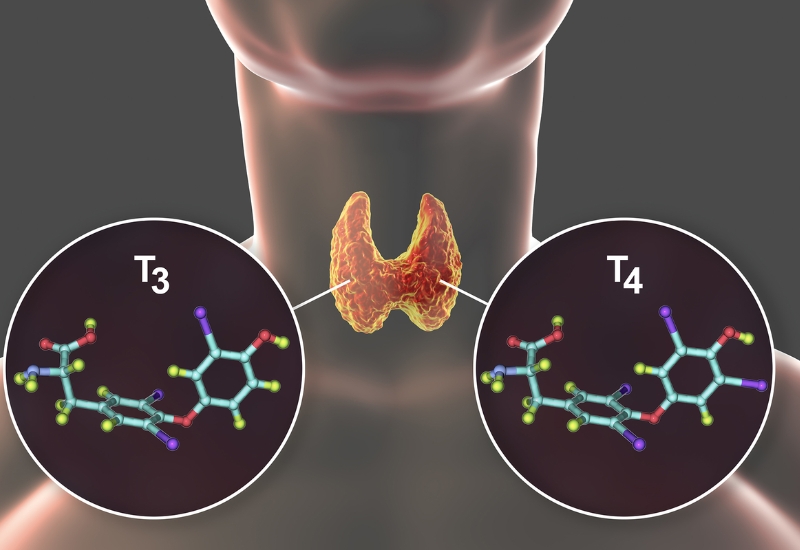
The Role of Thyroid Hormones in Metabolism
To understand how hypothyroidism affects weight gain, it is essential to first examine the role of thyroid hormones in regulating metabolism. The thyroid gland produces two primary hormones—T3 (triiodothyronine) and T4 (thyroxine)—which are critical for the functioning of every cell in the body. These hormones control the speed of numerous physiological processes, including metabolism, heart rate, temperature regulation, and even the breakdown of nutrients.
Thyroid Hormones and Metabolic Rate
Thyroid hormones increase the basal metabolic rate (BMR), which is the rate at which the body burns calories at rest. When thyroid hormone levels are low due to hypothyroidism, the BMR decreases significantly. This means that the body requires fewer calories to function, leading to a situation where even normal or modest food intake can lead to weight gain.
The thyroid hormones also regulate the conversion of carbohydrates into energy. Low levels of thyroid hormones impair the body’s ability to effectively utilize carbohydrates, leading to higher blood sugar levels. Over time, this can contribute to insulin resistance and weight gain, particularly around the abdominal area.
Thermogenesis, or the production of heat by the body, is another process influenced by thyroid hormones. Hypothyroidism reduces thermogenesis, which decreases the amount of energy expended in the form of heat. As a result, individuals with hypothyroidism may feel colder than usual and expend less energy throughout the day, which further contributes to weight gain.
Effects on Lipid Metabolism
Thyroid hormones also regulate lipid metabolism—the breakdown and use of fats. When thyroid hormone levels are low, the ability to break down fats is compromised, leading to increased fat storage in the body. Hypothyroidism has been linked to higher levels of LDL cholesterol (bad cholesterol) and triglycerides, which further increases the risk of cardiovascular diseases and weight gain.
The accumulation of body fat, particularly around the waist and thighs, is often exacerbated in people with hypothyroidism. This fat storage occurs as the body struggles to process and burn fats efficiently due to the hormonal imbalance. People with hypothyroidism may notice that even though they try to follow a healthy diet, they still struggle to lose weight or even gain weight, especially in the abdominal area.
Issues with Traditional Diagnosis and Treatment
Typically, doctors diagnose hypothyroidism based on blood tests that measure thyroid hormone levels. Once diagnosed, patients are prescribed synthetic thyroid hormones to compensate for the deficiency. However, this treatment focuses only on supplementing the missing hormones without addressing the root cause of the condition.
The use of medication often presents challenges, such as difficulties in adjusting the correct dosage, side effects of the drugs, and fluctuations in thyroid function depending on the season or overall health. This makes managing the condition challenging and dependent on lifelong medication.
Conclusion
Hypothyroidism is a complex condition that can have significant effects on weight. The slowed metabolism, increased insulin resistance, and hormonal imbalances associated with hypothyroidism can make it more challenging to maintain a healthy weight. However, with the right treatment and lifestyle adjustments, individuals with hypothyroidism can manage their weight effectively.

Thyroid hormone replacement therapy remains the cornerstone of treatment, but dietary modifications, regular exercise, and stress management can also play vital roles in preventing and managing weight gain. By understanding the connection between thyroid function and metabolism, individuals with hypothyroidism can take proactive steps to improve their overall health and quality of life.




